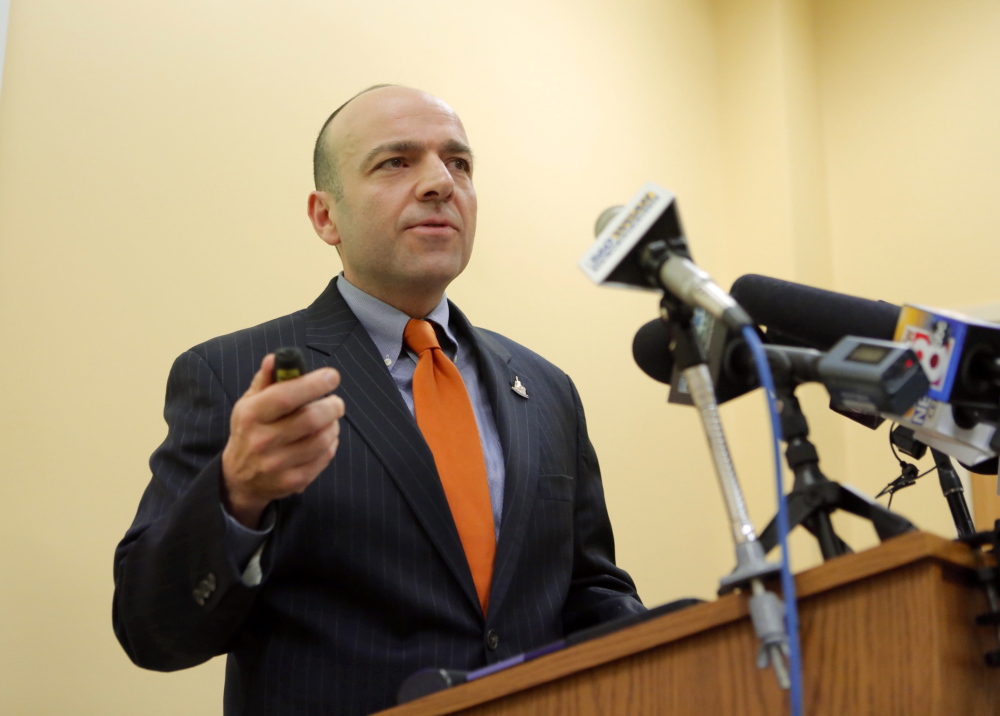This week, an editorial in the Bangor Daily News revealed that two pages of a report on Maine Department of Health and Human Services programs were plagiarized, nearly word for word, from a 2011 report by the Center on Budget and Policy Priorities. The document was the second written as part of a $925,000 no-bid contract between the LePage administration and conservative consultant Gary Alexander.
This was the latest in a string of incidents that have discredited Alexander’s work, including the revelation of a $575 million multiplication error in his previous report to the state (a document commissioned by LePage in an attempt to justify his refusal of federal funding to provide health care coverage for 70,000 Mainers).
Alexander’s firm and the LePage administration have both attempted to downplay the plagiarism. A statement from the Alexander Group called it a “footnoting problem,” and DHHS Commissioner Mary Mayhew accused Democrats and the media of attempting to “politicize punctuation.”
This wasn’t a punctuation error. A new analysis of the report by a plagiarism detection expert shows that many additional, lengthy sections were lifted verbatim from other sources with little or no attribution. It’s now clear that Alexander was dishonestly passing off the work of others as his own.
AN EXPERT ANALYSIS
I know a thing or two about plagiarism. I spent two years in college serving on Dalhousie University’s Academic Discipline Committee, where I helped to evaluate cases of suspected intellectual dishonesty, many of them very similar to the failures of attribution committed by the Alexander Group.
Dalhousie is also where I met Mike Smit, who knows far more about the subject than I do. At the time, he was a master’s student in computer science with a particular interest in plagiarism detection. He made national news by proving that one online anti-plagiarism service was keeping copies of students’ papers in violation of its terms of use.
I figured that Smit, now a professor of information management at our alma mater, would be the perfect person to help evaluate Alexander’s work. I was right. Within a few hours of first seeing the Alexander reports, he had identified 10 additional, specific examples of plagiarism, using a combination of plagiarism detection software and simple Google searches. He also assured me that there was likely much more.
“Generally, plagiarism in documents is like an iceberg: The bit you find is dwarfed by what you haven’t found yet,” said Smit. “Sometimes there is more verbatim text; other times ideas are also copied, and this is much harder to detect.”
THE STOLEN WORK
The obviously plagiarized portions of the reports stretch for many pages across both reports and come from a variety of sources.
Sometimes, as with the Center on Budget and Policy Priorities paper, the source is mentioned, but it’s not made obvious that content was copied wholesale. This is the case on Page 134 of the latest report, which references a paper by Mathematica Policy Research and then uses text from that document nearly verbatim without acknowledging the quotation.
Similarly, on Page 43 of the MaineCare report, a footnote reads, “Most information modified from Pewstates.org information on the states,” but what isn’t noted is that most of the text on the next four pages was lifted from a specific article on Pew’s Stateline news service.
In several other cases, no attribution is given at all. This is true of portions of the reports copied wholesale from policy papers published by the Kaiser Family Foundation, the Commonwealth Fund and the University of Southern Maine’s Muskie School of Public Service, as well as text taken from a number of Maine government documents.
One of Alexander’s favorite sources to copy from is himself. The reports contain verbatim content from a previous report the Alexander Group wrote for the state of Arkansas (with just the names of the states swapped). The latest report also re-uses the entire text of a 2012 op-ed that Alexander wrote for a Pennsylvania newspaper.
Self-plagiarism may not be quite as heinous an act as stealing the words of others, but where Alexander is being paid thousands of dollars per page, much of it diverted from assistance programs for struggling families and children, the least we should demand is that he does new work.
WE SHOULD GET OUR MONEY BACK
If I had seen systemic plagiarism like this at a university disciplinary hearing, we’d be talking about failing a student or rescinding a degree. Here, where it was committed by a highly paid consultant in order to justify cutting health care and assistance programs for struggling Mainers, we should be considering much harsher penalties.
At the absolute minimum, Alexander’s contract should be canceled and we should demand that the money paid to him so far is returned.
Mike Tipping is a political junkie who works for the Maine People’s Alliance. He can be contacted at: writebacktomike@gmail.com
Twitter: @miketipping
Send questions/comments to the editors.



Success. Please wait for the page to reload. If the page does not reload within 5 seconds, please refresh the page.
Enter your email and password to access comments.
Hi, to comment on stories you must . This profile is in addition to your subscription and website login.
Already have a commenting profile? .
Invalid username/password.
Please check your email to confirm and complete your registration.
Only subscribers are eligible to post comments. Please subscribe or login first for digital access. Here’s why.
Use the form below to reset your password. When you've submitted your account email, we will send an email with a reset code.